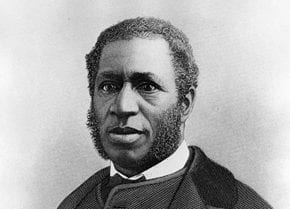Editor’s Note: Richard H. Cain, one of many black delegates to the South Carolina Constitutional Convention, had moved to South Carolina in 1865 after years of working as a minister and abolitionist.
…I may be mistaken, but I watched very closely the arguments made by the gentleman last Saturday, and I distinctly understood him to say he was in favor of taxing the lands so as to compel the sale of them, and throw them into the market. The poor would then have a chance to buy. I am unqualifiedly opposed to any measure of taxation for the simple purpose of compelling the owners to sell their land. So I believe the best measure to be adopted is to bring capital to the State, and instead of causing revenge and unpleasantness, I am for even-handed justice. I am for allowing the parties who own lands to bring them into the market and sell them upon such terms as will be satisfactory to both sides. I believe a measure of this kind has a double effect: first, it brings capital, what the people want; second, it puts the people to work; it gives homesteads, what we need; it relieves the Government and takes away its responsibility of feeding the people; it inspires every man with a noble manfulness, and by the thought that he is the possessor of something in the State; it adds also to the revenue of the country. By these means men become interested in the country as they never were before. It was said that five and one-seventh acres were not enough to live on. If South Carolina, in its sovereign power, can devise any plan for the purchase of the large plantations in this State now lying idle, divide and sell them out at a reasonable price, it will give so many people work. I will guarantee to find persons to work every five acres, I will also guarantee that after one year’s time, the Freedman’s Bureau will not have to give any man having one acre of land anything to eat. This country has a genial clime, rich soil, and can be worked to advantage. The man who can not earn a living on five acres, will not do so on twenty- five. I regret that another position taken by gentlemen in the opposition, is that they do not believe that we will get what we ask for, I believe that the party now in power in the Congress of the United States, will do whatever they can for the welfare of the people of this State and of the South. I believe that the noble men who have maintained the rights of the freedmen before and since their liberation, will continue to do everything possible to forward these great interests. I am exceedingly anxious, if possible, to allay ail unpleasant feeling—I would not have any unpleasant feeling among ourselves.
I would not have any unpleasant feelings between the races. If we give each family in the State an opportunity of purchasing a home, I think they will all be better satisfied.
But it is also said that it will disturb all the agricultural operations in the State. I do not believe if the Congress of the United States shall advance one million of dollars to make purchase of lands, the laborers will abandon their engagement and run off. I have more confidence in the people I represent. I believe all who have made contracts will fulfill
those contracts, and when their contracts have expired, they will go on their own lands, as all freemen ought to go. I claim it would do no harm. It would be a wonderful concatenation of circumstances indeed, to find that because the Government had appropriated one million of dollars for the purchase of lands, to see all of four hundred thousand people, rushing pell mell down to Charleston to get a homestead. I know the ignorance of the people, with whom I am identified is great. I know that four hundred years of bondage has degraded them, but I have more confidence in humanity than to believe the people will leave their homes and their families to come to Charleston just to get five acres of land.
If I understood the speaker in the opposition this morning, he offered it because he said it was simply a scheme for colored men. I wish to state this question right. If there was one thing on which I thought I had been specific, it was on that point. The clock had struck two and, I had dashed down my pen when the thought struck me it might be misunderstood. I retraced my steps and so shaped the petition as simply to state the poor of any class. I bore in mind the poor whites of the upper districts. I saw, not long ago, a poor white woman walk eighteen miles barefooted to receive a bag of corn and four pounds of meat, resting all night on the roadside, eating one-half and then go away, living on roots afterwards and half starved. I desire that class of people to have homes as well as the black man. I have lost long since that hateful idea that the complexion of a man makes any difference as far as rights are concerned, The true principle of progress and civilization is to recognize the great brotherhood of man, and a man’s wants, whatever he may be, or whatever clime he comes from, are as sacred to me as any other class of men. I believe this measure will advance the interests of all classes.



